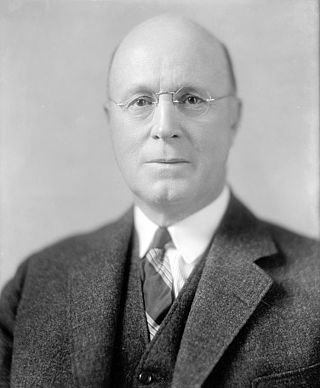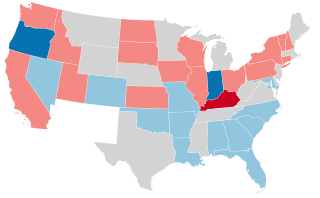
Tasker Lowndes Oddie was an American attorney and politician who served as the 12th Governor of Nevada and a United States Senator. He was a member of the Republican Party.

Mark Odom Hatfield was an American politician and educator from the state of Oregon. A Republican, he served eight years as Governor of Oregon, followed by 30 years as one of its United States senators, including time as chairman of the Senate Appropriations Committee. A native Oregonian, he served in the United States Navy in the Pacific Theater during World War II after graduating from Willamette University. After the war he earned a graduate degree from Stanford University before returning to Oregon and Willamette as a professor.

Patrick Anthony McCarran was an American farmer, attorney, judge, and Democratic politician who represented Nevada in the United States Senate from 1933 until 1954.

Frank Swett Black was an American newspaper editor, lawyer and politician. A Republican, he was a member of the United States House of Representatives from 1895 to 1897, and the 32nd governor of New York from 1897 to 1898.

Samuel Lewis Southard was a prominent American statesman of the early 19th century, serving as a U.S. Senator, Secretary of the Navy, and the tenth governor of New Jersey. He also served as President pro tempore of the Senate, and was briefly first in the presidential line of succession.

John Coit Spooner was a politician and lawyer from Wisconsin. He served in the United States Senate from 1885 to 1891 and from 1897 to 1907. A Republican, by the 1890s, he was one of the "Big Four" key Republicans who largely controlled the major decisions of the Senate, along with Orville H. Platt of Connecticut, William B. Allison of Iowa, and Nelson W. Aldrich of Rhode Island.

James Taylor Lewis was an American lawyer and politician who served as the 9th Governor of Wisconsin (1864–1866). Prior to his election as governor, he was the 7th Secretary of State of Wisconsin (1862–1864) and the 4th Lieutenant Governor of Wisconsin (1854–1856), and served one year each in the Wisconsin State Senate (1853) and Assembly (1852).

Solomon Foot was an American politician and attorney. He held numerous offices during his career, including Speaker of the Vermont House of Representatives, State's Attorney for Rutland County, member of the United States House of Representatives, and United States Senator.

Bill Bradbury was an American politician who served as a member of the Oregon Legislative Assembly and as the 23rd Oregon secretary of state from 1999 to 2009. Bradbury was an unsuccessful candidate for the 2010 Oregon gubernatorial election. In 2010, he was appointed to the Northwest Power and Conservation Council by Oregon Governor Ted Kulongoski.

William Nelson Runyon was the acting governor of New Jersey from 1919 to 1920 and a United States district judge of the United States District Court for the District of New Jersey.

The 1908–09 United States Senate elections were held on various dates in various states. As these U.S. Senate elections were prior to the ratification of the Seventeenth Amendment in 1913, senators were primarily chosen by state legislatures. Senators were elected over a wide range of time throughout 1906 and 1907, and a seat may have been filled months late or remained vacant due to legislative deadlock. However, some states had already begun direct elections during this time. Oregon pioneered direct election and experimented with different measures over several years until it succeeded in 1907. Soon after, Nebraska followed suit and laid the foundation for other states to adopt measures reflecting the people's will. By 1912, as many as 29 states elected senators either as nominees of their party's primary or in conjunction with a general election.

Frederick Holbrook was an American farmer, businessman, and Governor of the State of Vermont. Active in politics and government, first as a Whig, and later as a Republican, he was most notable for his service as the 27th governor of Vermont from 1861 to 1863.

Ebenezer J. Ormsbee was an American attorney and politician from Vermont. A Republican, he served as lieutenant governor from 1884 to 1886, and governor from 1886 to 1888.

Denver Dickerson was Speaker of the Nevada Assembly in 1943 and served in the U.S. Army during World War II. He was appointed Secretary of Guam in 1963 by U.S. President John F. Kennedy. As the office included the duties of lieutenant governor at that time, Dickerson occasionally served as the acting governor of Guam during his term.

Luther Elkins was an American politician and pioneer in the state of Oregon. Born in Cornville, Massachusetts and married to Philotheta Williams, he migrated to Oregon Territory in 1852, overland via the Oregon Trail. He served in the Oregon Territorial Legislature and was a delegate to the Oregon Constitutional Convention. He was elected to the Oregon State Senate in 1858, serving in the 1859 special session, for which he was selected as the Oregon Senate's first President. He also served in the 1860 regular session, again as president.

James Patrick Leamy was a United States district judge of the United States District Court for the District of Vermont.

The 2018 Nevada gubernatorial election took place on November 6, 2018, to elect the next governor of Nevada. Incumbent Republican Governor Brian Sandoval was ineligible to run for re-election, due to the absolute two-term limit established by the Nevada Constitution. Nevada is one of eight U.S. states that prohibits its governors or any other state and territorial executive branch officials from serving more than two terms, even if they are nonconsecutive.

The 2018 United States Senate election in Nevada took place November 6, 2018, to elect one of two U.S. senators from Nevada. Incumbent Republican senator Dean Heller lost re-election to a second full term, being defeated by Democratic nominee Jacky Rosen.

Charles T. Lassiter was a judge and state legislator in Virginia. He served in the Virginia House of Delegates and the Virginia Senate.



















